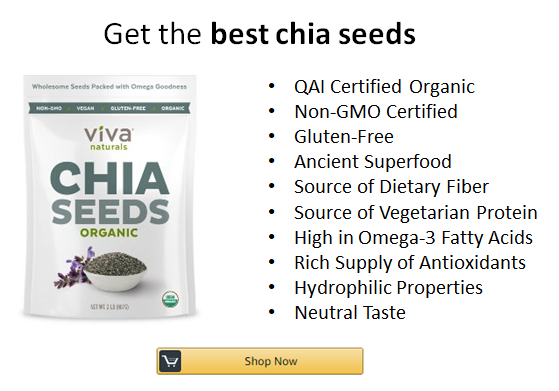Just one teaspoon of Chia seeds already supplies the body with a multitude of high-quality proteins, vitamins, minerals, trace elements, antioxidants, omega-3 fatty acids and dietary fibres. With their high nutritional value, the seeds of the chiaplant surpass the many foods:
✔ Their protein content is higher than that of oats, barley and wheat,
✔ they contain twelve times more magnesium than broccoli,
✔ five times more calcium than milk and
✔ Much more fibre than rye bread, for example
✔ Two tablespoons of chia seeds already cover half the daily requirement of vitamin E and vitamin E.-
✔ contain more than twice as many omega-3 fatty acids as 100 g salmon.
✔ nutritional values
Contents
Ingredients in Chia
The large amount of ingredients in Chia seeds provides our body with energy and gives the seeds high nutritional values. There are very few foods that have such a high nutrient density. 100g chia seeds contain among others
✚ 21 grams of protein,
✚ 38 g carbohydrates (of which 0 g sugar) and
✚ 31 g fat (saturated fatty acids: 4 g, monounsaturated: 3 g and polyunsaturated: 24 g).
This means that the nutritional value distribution of the Chia seeds is close to the optimal distribution of nutritional values recommended by the German Society for Nutrition (DGE) for adults. The DGE recommends the following breakdown:
✚ 55% carbohydrates,
✚ 30 % fat and
✚ 15% protein.
In comparison, chia seeds contain around
✚ 42% carbohydrates,
✚ 35 % fat and
✚ 24% protein.
Chia seeds are therefore a food source that can combine the nutritional values and ingredients of many different products in one food.
Calories
With this distribution of the nutritional values – especially considering the high fat content – it can be assumed that Chia seeds are very high in calories. Many other foods with a high fat content also contain many calories, such as almonds.
At about 486 kcal per 100 g, however, Chia seeds contain comparatively few calories: two tablespoons of Chia seeds contain only half as many calories as a small glass of milk. This is due in particular to the composition of the nutritional values contained in chia seeds and other important ingredients:
The proteins consist of amino acids that are essential for the body and cannot be produced by the body itself.
Chia seeds inhibit digestive enzymes that normally convert carbohydrates into sugar immediately. Thus energy is released more slowly but steadily.
77% of the fatty acids contained in the product are healthy omega-3 fatty acids.
The healthy ingredients of Chia seeds
What ingredients give Chia seeds their high nutritional value and low calories?
Fatty acids:
Chia seeds contain a large proportion of polyunsaturated omega-3 fatty acids. They not only help the body to reduce blood pressure, blood lipids and cholesterol levels, but also improve blood circulation and thus reduce the risk of thrombosis. Omega-3 fatty acids also support the functions of the nervous system and the brain. Chia seeds also contain omega-6 fatty acids, which are in a ratio of 1:3 to omega-3 fatty acids. This distribution is particularly beneficial for our body, as excessive intake of omega-6 fatty acids can promote the development of heart disease.
Proteins and amino acids:
The high protein content of the Chia seeds supports muscle growth and physical performance. In addition, the proteins contain numerous essential amino acids that cannot be produced by the body itself.
Vitamins (A, B1-B3 and E):
The vitamins of the B group support the metabolic processes in the body and the repair process of DNA. They are also involved in energy conversion.
Vitamin E is essential for lipid metabolism: it protects and preserves the polyunsaturated fatty acids.
Vitamin A is important for the function of the eyes and the immune system.
Minerals and trace elements:
The ingredients calcium, copper, phosphorus and manganese are involved in the proper functioning of our musculoskeletal system: they support the development of bone tissue. Calcium and magnesium are particularly important for muscle function, and calcium supports blood clotting.
Iron, manganese and copper are involved in the regeneration process of red blood cells – which supports their function, the transport of oxygen.
Copper, calcium and magnesium are also essential for the functioning of the brain and nervous system.
Antioxidantien:
The contained antioxidant selenium helps the body to reduce cell damage caused by free radicals. This protects the skin’s cells and slows down the aging process. The antioxidant is also responsible for the good durability of the Chia seeds, as it protects the seeds.
Dietary fiber:
These are mostly low-energy materials. This means that the body cannot use these ingredients contained in Chia seeds for energy production. They nevertheless play an important role for functions in the body, especially for the digestive system. Among other things, they have a cholesterol-lowering effect and prevent intestinal inertia: the enormous swelling capacity of the Chia seeds, which allows them to absorb 9-12 times their own weight of liquid within a few minutes, increases their volume and stimulates muscle activity in the intestine through the increased amount of food pulp. Chia seeds soaked in water can also supply the body with water for a longer period of time. Dietary fibres not only bind water, but also acids and toxins. Taken raw, Chia seeds support the body’s detoxification and help maintain acid-base balance.
Chia seeds are highly recommended
There is hardly any function in the human body on which Chia seeds have no health-promoting effect. Thanks to their immense nutrient density, the small energy suppliers achieve high nutritional values and contain only a few calories.


